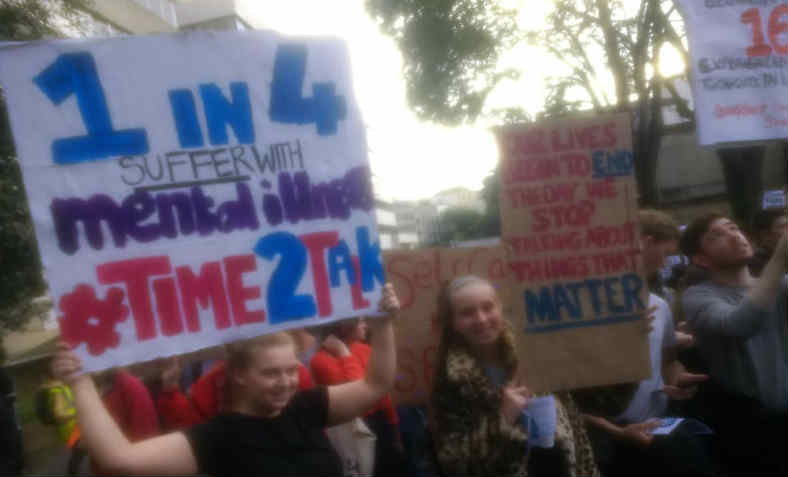 Bristol Mental Health March. Photo: Steven Cooper
Bristol Mental Health March. Photo: Steven Cooper
Students at the University of Bristol demonstrated in huge numbers this Friday to protest inadequate mental health provision, reports Steven Cooper
In a statement of understandable solemn and angry unity, an estimated 1000 students marched in Bristol on Friday 25th May. The march occurs in the tragic circumstance of 3 sudden deaths of students in little over 3 weeks, and what is believed to be the 10th such death in about 18 months, some of which have been confirmed as suicides. Speakers at the rally were rightly keen to stress the need to not sensationalising any reporting surrounding these.
Organisers of the march from ‘Improve Bristol University’s Mental Health Services’ and ‘Keep our Communities’ declared
It’s time to march. It’s time to change.

After an increased culture of mobilisation surrounding the UCU strikes, where student solidarity was an important feature of the campaign helping enable students to organise, and this march bought wide support across different segments of the student body to the streets over this highly important cause.
In tandem with a survey, students were demonstrating with ‘the aim of improving the University of Bristol’s Mental Health and Wellbeing services in the wake of the tragedy of the recent student deaths. We want to remember the lives of those who have suffered so much and improve the service for those who are still vulnerable.’
The march featured a number of agreed upon demands from organisers for the university such as:
- More training on mental health for all student-facing staff
- Increasing the capacity of the Student Counselling Service to reduce waiting time
- Access to more counselling sessions per cycle
- A better process for referring students from counselling to more specialist services
- Increasing investment in student support services
- Making it easier for students to understand what support is available to them
Whilst there are specific issues at the University of Bristol in particular, nationally almost five times as many students have disclosed a mental health condition to their university as compared with 10 years ago according to IPPR research.
As Psychologists Against Austeritys parliamentary briefing paper has found economic conditions where austerity has led to stagnant growth and more limited career opportunities and insecurity which can effect mental health. This can lead to more pressures to achieve, and especially for students is exacerbated by higher tuition fees and debt. This can make academia more stressful and can impact mental health issues amongst students.

As one of the speakers at the rally cited ‘In 2005 £1.4 billion was allocated for mental health for children and adolescence for 5 years, but less than 50% of surveyed services used the money what it was dedicated for’, highlighting a lack of parity of esteem between mental and physical health.
Austerity has led to cuts in mental health funding with 34 out of 55 mental health trusts receiving a lower income in 2017 than 2012. Further, between 2010 and 2015, mental health trusts suffered real terms cuts of 8.25%, losing the equivalent of £598 million from their budgets.
How the campaign continues to keep pressure on the university to act to improve services will be interesting to follow and support.

